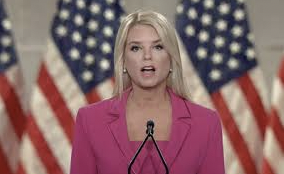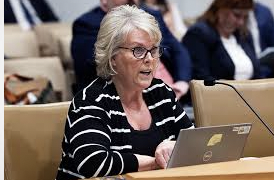My inbox is jammed with updates, quotes about from I to III happening.
AP appear to have the most realistic take at the moment
They write
WASHINGTON (AP) — The U.S. Drug Enforcement Administration will move to reclassify marijuana as a less dangerous drug, The Associated Press has learned, a historic shift to generations of American drug policy that could have wide ripple effects across the country.
The proposal, which still must be reviewed by the White House Office of Management and Budget, would recognize the medical uses of cannabis and acknowledge it has less potential for abuse than some of the nation’s most dangerous drugs. However, it would not legalize marijuana outright for recreational use.
The agency’s move, confirmed to the AP on Tuesday by five people familiar with the matter who spoke on the condition of anonymity to discuss the sensitive regulatory review, clears the last significant regulatory hurdle before the agency’s biggest policy change in more than 50 years can take effect.
Once OMB signs off, the DEA will take public comment on the plan to move marijuana from its current classification as a Schedule I drug, alongside heroin and LSD. It moves pot to Schedule III, alongside ketamine and some anabolic steroids, following a recommendation from the federal Health and Human Services Department. After the public comment period and a review by an administrative judge, the agency would eventually publish the final rule.
Read the full report at
https://apnews.com/article/marijuana-biden-dea-criminal-justice-pot-f833a8dae6ceb31a8658a5d65832a3b8
As of 29 April there’s nothing on the DEA press release page on the topic
https://www.dea.gov/what-we-do/news/press-releases
I also trust the Marijuana Moment angle
Schumer Says DEA Marijuana Rescheduling Decision Is ‘Historic,’ But He Remains ‘Strongly Committed’ To Passing Banking And Legalization Bills
DEA Agrees To Reschedule Marijuana Under Federal Law In Historic Move Following Biden-Directed Health Agency’s Recommendation
Ganjapreneur write..
BREAKING: DEA Reportedly Agrees to Move Cannabis to Schedule III
BREAKING: DEA Reportedly Agrees to Move Cannabis to Schedule III
Unsurprisingly there’s a lot of opinion out there, with a lot more to come !!!
Here’s a few things that have landed in the inbox this morning
“Rescheduling favors industry more than individuals. In that regard, it likely will impact the 280E tax issue which drastically impacts cannabis operator profit margins, potentially free up some commercial financing along the lines of the SAFE Bank Act, and give comfort to ancillary businesses that they are not part of criminal enterprise as, unlike Schedule I, Schedule III recognizes lawful uses. This also, is the first step on a very long road and, while a promising start, is far from the end of the fight.”
DEA Poised to Reschedule Marijuana
Cue the Ron Paul “It’s Happening” gif and shout it from the rooftops: DEA will reschedule marijuana from Schedule I to Schedule III of the Controlled Substances Act, per a report from the AP. The United States federal government, through two federal agencies, is officially recognizing that cannabis “has a currently accepted medical use in treatment” and has a “potential for abuse less than drugs or other substances in Schedules I and II.”
All signs pointed towards this result, though most didn’t want to believe it until an announcement. Known repercussions will be massive, but many, many unknowns exist. And the process towards official rescheduling and federal regulation could be arduous. The White House Office of Management and Budget (OMB) will now review the DEA’s rescheduling proposal, and once approved, a period for public comment will commence. Then the DEA will publish the final rule. Questions abound about exactly what the final rule will look like and how a new federal regulatory regime over marijuana will impact the plethora of state programs, old and new alike, currently operating.
Stay tuned over the next several weeks as we dive into the particulars of the administrative process that lies ahead and explore some of the ways this monumental shift in U.S. drug policy will (or may) affect the current multibillion-dollar U.S. cannabis industry.
After fifty years, the federal government finally acknowledged that marijuana has medical value and is not as dangerous as heroin. As first reported by the Associated Press and confirmed by Marijuana Moment, on April 30, 2024, the Drug Enforcement Administration (DEA) announced it will be rescheduling marijuana from Schedule I to Schedule III under the Controlled Substances Act (CSA). This will not legalize state-level adult-use and medical marijuana markets, but it is the most significant federal marijuana reform in the history of the United States. We knew the DEA was close to an announcement as early as June 2023, but this remains an astounding development for anyone following the cannabis industry.
How Has the Process of Rescheduling Marijuana Worked?
The marijuana rescheduling process began in October 2022 when President Joe Biden requested the Department of Health and Human Services (HHS) reevaluate marijuana’s status as a Schedule I substance. In August 2023, HHS provided its recommendation to move marijuana from Schedule I to Schedule III. Schedule I substances are deemed to have no currently accepted medical use and include substances such as heroin, LSD, and MDMA. Schedule III drugs include ketamine and Tylenol with codeine.
Will Rescheduling Legalize Marijuana?
Moving marijuana from Schedule I to Schedule III will not legalize the use, production, manufacturing, sale, or possession of marijuana outside of the tightly regulated parameters of the CSA. State-legal markets are not in compliance with the CSA, under which the entire lifecycle of production is strictly controlled and overseen by the DEA and the Food and Drug Administration (FDA), and which further requires that drugs be manufactured by federally licensed operators and then distributed only by pharmacies and health care professionals. In contrast, state-legal medical and adult-use marijuana programs are currently overseen by state-level regulatory bodies.
Additionally, the standards for federal drug production and state marijuana production are vastly different. On the federal level, compounds included in drugs must be isolated and refined for clinical use. Drugs come in many forms, but each different form must contain consistent components every time. While marijuana products are tightly regulated, they come in many forms, and although ingredients and cannabinoids must be disclosed and tracked, states do not require the same precision as the federal government.
For more information, see our previous posts on the legal impacts of rescheduling:
- From Schedule I to Schedule III: Potential Shift in Marijuana’s Legal Status
- Rescheduling Marijuana: Understanding the Legal Impacts
How Will Rescheduling Marijuana Impact Marijuana Taxation?
States tightly regulate marijuana cultivation, processing, distribution, and sales. It is unclear whether or not federal policy regarding these activities will change. What we do know is that Internal Revenue 280E will no longer prevent marijuana businesses from taking deductions. This is because the text of 280E is limited to the trafficking of Schedule I and Schedule II substances and does not extend to Schedule III substances:
No deduction or credit shall be allowed for any amount paid or incurred during the taxable year in carrying on any trade or business if such trade or business (or the activities which comprise such trade or business) consists of trafficking in controlled substances (within the meaning of schedule I and II of the Controlled Substances Act) which is prohibited by Federal law or the law of any State in which such trade or business is conducted. (Emphasis added).
The Internal Revenue Service will likely provide guidance on marijuana taxation in the coming months. For now, we know that the text of IRC 280E does not apply to the trafficking of Schedule III substances.
When Will Rescheduling Take Effect?
Rescheduling is not going to happen immediately. There are requirements under the Administrative Procedures Act (APA) that must be observed. Going forward, we expect rulemaking to occur over the next few months.
To reiterate, the move to reschedule will take time to implement, and as of this writing, marijuana remains a Schedule I substance. For more on the timeline for rescheduling, see our previous post on the topic: What is the Timeline for Rescheduling Marijuana?
Bottom Line
Rescheduling marijuana from Schedule I to Schedule III under the CSA will not address many of the issues that plague the cannabis industry. For example, it will not resolve – or even provide clarity – with respect to a wide variety of operational, financial, or legal issues faced by the industry, such as banking, insurance, bankruptcy, or interstate commerce. As stated above, marijuana operations legal at the state level are not compliant with the CSA, and under federal law, Schedule III substances still fall within the scope of the CSA. It is unclear whether federal agencies like the FDA will change their enforcement policies around marijuana. So far, the FDA has largely left state-regulated marijuana businesses alone.
If you currently operate in the marijuana space, or are considering entering the space, it is critical that you are actively tracking relevant developments in light of rescheduling. We will continue to report at the greenleafbrief.com on the process as these matters develop and analyze and provide answers with respect to how federal policies will change the cannabis landscape across the United States.
Marijuana Rescheduling is Here: How DEA’s Decision Will Impact Cannabis Businesses
DEA Moves to Reclassify Marijuana from Schedule I to Schedule III, Marking Historic Shift in U.S. Drug Policy
Statements below from leaders of national cannabis law firm Vicente LLP, which is actively engaged in the Coalition for Cannabis Scheduling Reform
Attorneys with specialized knowledge of the federal drug scheduling process are available for interviews and will host a free online briefing Friday to discuss next steps and implications for the cannabis industry — REGISTER HERE
DENVER — The U.S. Drug Enforcement Administration announced Tuesday it will reclassify cannabis from Schedule I to Schedule III, per the August recommendation from the U.S. Department of Health and Human Services. The decision stems from an October 2022 directive from President Joe Biden to HHS and the Department of Justice, requesting they initiate the process of reviewing cannabis’ Schedule I classification.
The DEA’s announcement marks a historic shift in federal drug policy. For more than 50 years, cannabis has been classified under Schedule I, which is reserved for the most dangerous substances with no accepted medical value and high potential for abuse. The agency’s decision to reschedule cannabis to Schedule III acknowledges cannabis’s medical efficacy and relatively low potential for abuse.
“This is a remarkable about-face by the DEA, which spent decades denying the true medical value of the cannabis plant,” said Brian Vicente, founding partner of national cannabis law firm Vicente LLP. Vicente LLP has been at the forefront of cannabis policy reform for more than a decade and actively engaged in the Coalition for Cannabis Scheduling Reform, which strongly advocated for removing cannabis from Schedule I.
“While a strong case can be made for removing cannabis from the federal drug schedules entirely, rescheduling marks a huge step forward for commonsense cannabis policy in our country,” Vicente said. “This action will have massive impacts, both practically for the cannabis industry and symbolically for the reform movement. We have entered a new era of dialogue and policy around this historically maligned plant.”
Attorneys and policy experts from Vicente LLP have published an analysis of the decision that highlights the next steps in the rescheduling process and the implications of Schedule III for the state-legal cannabis industry. The firm will also host a free online briefing Friday at 10 a.m. MT, at which several national cannabis policy thought leaders will be available for Q&A, including attorneys with specialized knowledge of intellectual property laws and the 280E tax issue, both of which will be significantly impacted by rescheduling. See below for details.
The DEA’s proposed rule is expected to undergo a public comment period, after which it will issue a final rule based on HHS’s evaluation and recommendation, DEA’s own analysis, public comments, and the record of any hearing it holds on the subject. Public comment periods are typically 30-60 days but can be extended to 90 days if DEA determines more time is needed.
“The DEA’s proposed rule is a major step forward toward the ultimate goal of ending federal cannabis prohibition,” said Vicente LLP partner Shawn Hauser, who closely follows the federal scheduling process. “This will be a historic rulemaking process to formalize the DEA’s proposed reclassification. It’s likely the best outcome possible, given the realities of the federal administrative review process. This historic action by the Biden administration has the potential to embolden Congress to finally pass legislation that federally legalizes and regulates cannabis for medical and adult use.”
About the Online Briefing
On Friday, May 3, at 10 a.m. MT/12 p.m. ET, Vicente LLP will host a free public briefing, “Cannabis Rescheduling: Implications and Next Steps,” covering:
- DEA’s decision and the timeline, next steps, and potential hurdles in the rescheduling process;
- implications for the state-legal cannabis industry, including federal enforcement efforts, the 280E tax issue, banking access, intellectual property opportunities and considerations, and other practical business considerations; and
- the road ahead for further cannabis-related policy reform, interstate commerce, and social equity.
Speakers will include Brian Vicente, Shawn Hauser, and Andrew Livingston of Vicente LLP, along with Mitzi Keating, a CPA at Citron Cooperman, and Erich Veitenheimer, an intellectual property attorney with VRIT3IP LLC.
Register now and find more details at https://bit.ly/marijuana-
Client Alert: DEA to Reclassify Cannabis
Today the Associated Press broke the news of the DEA’s long-awaited decision to move forward with the plan to reclassify cannabis from Schedule I to Schedule III. The change has been decades in the making, and comes as a consequence of President Biden’s October 2022 directive to his administration to review the classification of cannabis. While the specific rule still needs to be written and adopted, this decision is historic nonetheless. Earlier in the year, a report in The Wall Street Journal indicated that a rift existed between the White House and the DEA on the issue. That, combined with implications relating to international treaties, were reasons enough to make the decision far from a done deal.
The move will have an almost immediate positive impact on the industry, a fact that is confirmed by stock prices in the industry springing ten percent and higher on the day of the announcement. One such impact is that cannabis businesses will no longer be subject to IRS Tax Rule 280E, which prevents businesses that receive income from Schedule I and II substances from deducting regular expenses like nearly all other businesses, resulting in a tax consequence multiples over what non-cannabis businesses must pay. Some cannabis businesses, like Trulieve and TerrAscend, have decided to stop paying these taxes, potentially saving over 150 million dollars toward their business. With cannabis at Schedule III, this level of speculation will no longer be necessary. There should be other positive consequences of federal rescheduling, such as bankruptcy protection and access to the U.S. Patent and Trademark Office, to name a couple.
Without being able to fully digest the end product, these comments are still speculative, but Prince Lobel will continue to monitor this space. Back in 2014, Prince Lobel was the first law firm of its type to assist clients in entering the legal cannabis market in Massachusetts, and has since been a leader in the industry with offices in both Massachusetts and New York.
BREAKING NEWS: DEA TO RESCHEDULE CANNABIS
Cannabis would move to Schedule III from Schedule I under this reclassification.
In a move long awaited by the cannabis industry, the Drug Enforcement Administration (DEA) has decided to re-schedule cannabis. Currently classified under Schedule I, along with heroin, cannabis would now move to Schedule III, along with ketamine and anabolic steroids.
This would not legalize cannabis for adult-use; rules and regulations would still apply, and there would be criminal prosecution of those who deal in cannabis without a license.
Re-scheduling, although much closer than it was yesterday, is still a ways off. The DEA rule needs to be reviewed by the White House Office of Management and Budget. After that review, there would be a public comment period (which looks to be at least 60 days, although no firm timeline has yet been set), after which the DEA rule would be published and go into effect. Given the controversy surrounding both the rescheduling and legalization of marijuana, we would not be surprised if there is litigation that seeks to stop the rescheduling from going into effect.
This story was first reported by the Associated Press. More details and commentary will appear in this week’s Week In Weed.
The biggest legal shift in the cannabis industry in decades just occurred on the heels of the Drug Enforcement Administration’s (DEA) proposal today for cannabis rescheduling. Specifically, as many anticipated, the DEA will exercise its authority to reschedule cannabis from a schedule I controlled substance to a schedule III controlled substance on the Controlled Substances Act (CSA). This cannabis rescheduling comes in part from the recommendation of the Department of Health and Human Services to reschedule cannabis from a I to a III on the CSA. The DEA’s proposal must now go before the White House Office of Management and Budget (OMB) for review and approval. The OMB’s primary functions relate to budget formulation and execution, legislative coordination and clearance, executive orders and proclamations, information and regulatory affairs, and mission-support areas and management initiatives. OMB will very likely review this DEA proposal for budget impact, regulatory impact, and legislative coordination.
What Happens Now?
Administrative Process for Cannabis Rescheduling–the Road is Likely Long (and Tortured)
At the end of last year, we wrote about the cannabis rescheduling process from the procedurally and technical perspective. The proposed cannabis rescheduling rule, or Notice of Proposed Rulemaking, is the official document that announces and explains the DEA’s plan to address and accomplish rescheduling. The proposed rule will be published in the Federal Register to notify the public and to give them an opportunity to submit comments. The proposed rule and the public comments received on it will form the basis of the final rule.
In general, agencies will specify a comment period ranging from 30 to 60 days, but the time period can vary. For complex rulemakings, agencies may provide for longer time periods, such as 180 days or more. Agencies may also use shorter comment periods when that can be justified. Members of the public may request that the agency allow more time to submit comments, and agencies may consider late‐filed comments, if their decision‐making schedule permits it.
During the comment period, an agency may also hold public hearings where people can make statements and submit data. Some agencies operate under laws that require rulemaking hearings. Others may hold public meetings to collect more information or to help affected groups get a better understanding of the proposed rule. After the comment period closes, an agency may establish a second period for reply comments (comments that respond to prior comments). A reply period is not required by law. The reply comment period enables people to respond to comments that agencies received at the end of comment period, creating more of a public dialog.
At the end of the rulemaking process, the agency must base its reasoning and conclusions on the rulemaking record, consisting of the comments, scientific
data, expert opinions, and facts accumulated during the pre‐rule and proposed rule stages. Obviously, this formal rulemaking process to get to a final rule can take a long time to finalize, and we have no doubt that it will be a lengthy process to secure cannabis rescheduling.
The Lawsuits to Stop or Greatly Delay Cannabis Rescheduling
Without a doubt, we’re going to see legal challenges to the DEA’s cannabis rescheduling efforts. Challenges will likely range from allegations of procedural deficiencies, the DEA exceeding its rulemaking authority, and claims that the proposed final rule is arbitrary and capricious. We anticipate that petitioners here will range from prohibitionists to those who want to see cannabis completely de-scheduled. These administrative challenges, even if unsuccessful, will also delay implementation of the final cannabis rescheduling rule.
Existing State Markets and Cannabis Rescheduling
State Regulations
Also at the end of last year, we wrote about the many outcomes stemming from a schedule III move. From the state cannabis regulatory perspective, cannabis rescheduling likely won’t change anything. These state-licensed businesses still won’t be able to move cannabis in interstate commerce, cannabis banking will remain precarious but alive in line with the 2014 FinCEN guidelines, and these businesses will remain unlawful in the eyes of the Feds. However, it is highly unlikely that state-regulated adult use and medical markets are flipped on their heads overnight by state legislative or regulatory action. Things will proceed as usual regarding state cannabis licensing, at least for a while.
The Feds
This is one of the biggest questions about what the Feds will do regarding enforcement of existing schedule III restrictions when it comes to state-licensed adult use and medical cannabis businesses. Similar to state regulators, we don’t foresee things changing for state-licensed businesses overnight, but that also all depends on how the Department of Justice (DOJ) plans to handle this seemingly legal paradox when it comes to schedule III controlled substances. Will we receive a “Garland Memo” similar to the 2013 Cole Memo to protect existing state markets? Will we receive some kind of Congressional carve out to exempt state cannabis licensees from schedule III restrictions, like having to register facilities with the DEA, pharmacy-only dispensing, and complying fully with Food and Drug Administration (FDA) regulations? The jury is out on this one.
IRC 280E
Yes, one of the biggest benefits of cannabis rescheduling is that Internal Revenue Code 280E will no longer apply to state-licensed cannabis businesses. However, that impact will not manifest unless and until the DEA adopts its final cannabis rescheduling rule. So, prepare for 280E relief to take a good amount of time.
How to Prepare Yourself for this Cannabis Reschedule
If you’re a state-licensed cannabis business, here’s how to prepare yourself for this epic change in federal cannabis laws and rules:
- You should strongly consider compiling comments to submit to the DEA during this incredibly important rulemaking process. It’s your one shot to have your voice and positions heard as this rule will impact your cannabis business for years to come.
- Task a staff member, your general counsel, or your outside legal counsel with keeping an eye on the rulemaking process and its fits and starts so that you’re apprised of where things are going with the DEA.
- Keep your head on a swivel for a new DOJ memo on state markets and enforcement in light of cannabis rescheduling (which is more likely than some kind of act from Congress).
- Realize that 280E relief is not instant. You need to continue to manage and run your cannabis business with that in mind, and investors should be mindful of this delta, too.
- You will not in any way be able to move your cannabis goods from state to state; schedule III doesn’t open up interstate commerce.
- Talk with your financial institution about what they’re planning to do on the back of cannabis rescheduling. The answer should be “not much” unless and until the 2014 FinCEN guidelines change or are updated.
- Keep your state cannabis licensing up to date and in good standing. Those state laws and regulations will still apply unless and until changed by the states.
- If you have investors, you likely have a duty to keep them apprised of what the company is doing and plans to do in light of this cannabis rescheduling. So, continue to stay educated on rulemaking and its consequences and keep lines of communication with investors wide open to ensure clarity and understanding on their part.
We’ll all be watching what happens with the DEA during this historic legal process, and we’ll be sure to blog here to keep you up to date and in the know.
BREAKING: DEA Will Reschedule Cannabis to a Schedule III Drug
Here are some quotes from excutives in the cannabis industry
- “Today marks a historic step forward from the Federal government on cannabis reform. The DEA’s agreement with the HHS to reschedule cannabis from Schedule I to Schedule III is a pivotal move that opens various opportunities to cannabis operators like Ascend. This favorable industry development could improve customer and patient access, enhance access to funding, provide broader research avenues, and more. As we navigate this transformative landscape, Ascend eagerly anticipates exploring further potentials, including potentially up-listing to major exchanges. We look forward to seeing how this plays out in the coming weeks.” – John Hartmann, CEO of Ascend Wellness
- “This is a major nail in the coffin on a failed 50-year prohibition policy. Good riddance, let it rest in peace. We’re finally headed in the right direction after all these years, but we still have a long way to go. This is a major milestone for a marginalized industry that’s been fighting for recognition. We’re more than ready to be recognized as a legitimate industry on its way to becoming a $50 billion market. It’s about time we embraced progress and leave outdated practices behind.” – John Mueller, Founder & CEO of Greenlight
- The profound impact of rescheduling cannabis from Schedule I to Schedule III would signify a crucial shift in the perception of cannabis, recognizing its medical potential and solidifying its legitimacy in the financial realm. From a banking and lending perspective, we believe that the reclassification of cannabis will broaden lending opportunities for cannabis businesses, leading to access to lower interest rates, increased access to capital and improved financial stability across the industry. This newfound access to traditional financing channels has the potential to stimulate growth, innovation and compliance efforts within the industry, ultimately fostering economic development and job creation. Furthermore, the global implications of potential rescheduling cannot be overlooked. Elevating cannabis to Schedule III demonstrates the United States’ leadership on an international scale, and has the potential to positively influence agreements and international treaties with organizations like the United Nations and World Health Organization. This shift could hold significant weight, especially for other countries seeking to challenge current classifications and legalize cannabis sales. – Sundie Seefried, CEO of Safe Harbor Financial
- “This rescheduling carries significant implications for the entire cannabis landscape. Firstly, it will alleviate the burdens imposed by 280E tax regulations, bolstering the credit quality of cannabis operators, including those within NewLake’s portfolio. We project that our tenants stand to collectively save over $400 million annually in taxes, leading to increased cash flows for their businesses. Moreover, this pivotal move by the federal government is poised to stimulate additional investment in the sector, potentially enabling operators to strengthen their balance sheets, thus enhancing the industry’s credit quality, including our tenant base.” – NewLake Capital Partners CEO Anthony Coniglio
- Embracing this momentous shift in marijuana classification isn’t just about changing policies; it’s about a new era of understanding and opportunity. At Carma HoldCo, we’ve always championed the transformative power of cannabis, not just as a product but as a catalyst for positive change. This reclassification will not be just a regulatory adjustment; it’s a validation of what we’ve known all along: cannabis isn’t a threat; it’s a solution. It’s time to rewrite the narrative, break down barriers, and usher in a future where cannabis is celebrated for its potential to heal, inspire, and empower. And as we stand on the cusp of this historic moment, let’s remember: we’re just getting started. – Adam Wilks, CEO of Carma HoldCo
First trade body off the block is
Via AP: US drug control agency will move to reclassify marijuana in a historic shift
WASHINGTON (AP) — The U.S. Drug Enforcement Administration will move to reclassify marijuana as a less dangerous drug, The Associated Press has learned, a historic shift to generations of American drug policy that could have wide ripple effects across the country.
The DEA’s proposal, which still must be reviewed by the White House Office of Management and Budget, would recognize the medical uses of cannabis and acknowledge it has less potential for abuse than some of the nation’s most dangerous drugs. However, it would not legalize marijuana outright for recreational use.
The agency’s move, confirmed to the AP on Tuesday by five people familiar with the matter who spoke on the condition of anonymity to discuss the sensitive regulatory review, clears the last significant regulatory hurdle before the agency’s biggest policy change in more than 50 years can take effect.
The Cannabis Freedom Party
DEA Rescheduling of Cannabis A Big Win for Patients
Cannabis Freedom Party Lauds the Decision to Move Cannabis to Schedule 3
April 30, 2024
Washington – The Cannabis Freedom Party (CFP) is very pleased to learn of the news from the Associated Press that the U.S. Drug Enforcement Administration will move to reclassify cannabis as a Schedule 3 drug. The CFP sees this reclassification as a major win for the industry and patients.
“Moving cannabis from Schedule 1 to a Schedule 3 drug on the Controlled Substances List is just the first winning drive in what’s going to be a long hard-fought game to bring about an end to the War on Drugs. While some may say that descheduling is truly what’s needed, today’s decision put necessary points on the board for medical cannabis patients across this country,” said Ricky Williams, Co-Founder of CFP.
According to the DEA, Schedule III drugs, substances, or chemicals are defined as drugs with a moderate to low potential for physical and psychological dependence. Schedule III drugs abuse potential is less than Schedule I and Schedule II drugs but more than Schedule IV. Some examples of Schedule III drugs are: products containing less than 90 milligrams of codeine per dosage unit (Tylenol with codeine), ketamine, anabolic steroids, testosterone.
“We have long believed in the therapeutic potential of cannabis, and we’ve witnessed firsthand its ability to alleviate a wide range of conditions including the repercussions of years of injuries from the NFL. The rescheduling of cannabis to Schedule 3, this will now open the door for countless other patients who need access to this life saving medicine,” said Jim McMahon, Co-Founder of CFP.
“This will also bring about the end to 280-E, the crushing tax code which has burdened so many legal cannabis businesses for the past 10 years. This will help bring about more investment into the space and allow legal businesses to finally benefit from federal tax deductions. Our hope now is that the federal government will move swiftly to get this reclassification implemented and let cannabis have the necessary first touchdown it so desperately needs,” said Kyle Turley, Co-Founder of CFP.
About Cannabis Freedom Party
The Cannabis Freedom Party (CFP) mobilizes communities for voter outreach, advocates tirelessly for cannabis normalization, and upholds the principles of personal choice. At CFP, our passion fuels a movement for change, inviting everyone to join us in breaking down stigmas and championing the rights to wellness and freedom. Stand with us, contribute to our cause, and together, let’s create a future where the value of cannabis and the power of choice are recognized and celebrated.
|
|
Hey Cannabis Insiders – Its a huge cannabis news day!
Obviously, we’re reaching out with the groundbreaking news that the DEA has agreed to reschedule cannabis! Regardless of your feelings about this change it is unquestionably a historic moment for the cannabis industry!
It Happened – The DEA Is Moving Cannabis to Schedule III
The DEA has officially proposed moving cannabis from Schedule I to Schedule III under the U.S. Controlled Substances Act. This significant shift in federal drug policy opens up new possibilities for research and financial activities within our industry.
It is essential to understand that this is merely the initial phase of a broader process; rescheduling does not fix a whole host of federal issues. Thus, it’s crucial for all stakeholders to be engaged and actively participate. Additionally, the full ramifications of this change, both positive and negative, for adult-use cannabis businesses are not yet fully understood. And several critical steps, including a public comment period, must still take place before this reclassification can be implemented.
This all underscores that there is still much work to be done and ample opportunity for us to weigh in (or complications to arise). Keep reading, there are more details below.
Help Shape Cannabis Policy – Introducing the CIAO Policy Committee:
Developments like this are exactly why the CIAO board established the CIAO Policy Committee earlier this month. This committee will be our principal forum for gathering member feedback, identifying industry issues, developing solutions, and crafting effective policy.
Meetings will begin within the next two weeks. Silver and Gold Members will comprise this essential committee—all Gold level members will automatically receive seats, and Silver level members can join through an application process to ensure all license types, business sizes, and geographies are represented.
We will send out details about committee membership and how to apply before the end of the week – There is no better time or way to get involved so become a member today!
United We Thrive – Join Us To Help Shape The Future:
This monumental shift is just the beginning of a groundbreaking federal cannabis reform. Now, more than ever, your involvement is crucial. By uniting our voices, we can effectively advocate for the future the cannabis industry’s deserves and actively shape our regulatory landscape. Join the fight—click here to become a CIAO member today and make sure your voice is heard.
The CIAO Will Keep You Informed:
As the federal regulatory landscape rapidly evolves, the CIAO is committed to keeping you informed. Mark your calendars for our next Cannabis Insiders Meeting on May 13th, we will discuss the implications of rescheduling, how it affects you, and the federal landscape in general. Additionally, we’re already started engaging with our cannabis champions in Congress and locally to make sure our voices are heard on this issue, but your involvement is key. Become a member today!
Understanding the Impact of Rescheduling
The DEA’s decision to move cannabis to Schedule III is a profound change, yet it is just one step in a complex regulatory process. Here’s what comes next:
- Next Steps – Review and Public Comments: The proposal first must be reviewed by the Office of Management and Budget (OMB). If it is approved it will then be published for public comment. This stage is critical as it allows industry stakeholders like you to provide input.
- 280e Taxation Changes: The most significant impact that cannabis business can expect form this change is with 280e. With the removal from Schedule I, cannabis businesses should no longer be subject to IRS Code 280E restrictions, allowing for deductions that were previously denied. This can not happen soon enough as we all know!
- Implications for Business: Transitioning to Schedule III reduces certain financial and research restrictions, potentially opening up new opportunities for growth and innovation in the industry. However, it does not legalize cannabis at the federal level nor does it automatically adjust state laws or resolve issues like banking or insurance disparities. Simply, it leaves unaddressed many of the issues we all face because of federal prohibition.
- Regulatory Uncertainty: Despite these advances, the landscape will remain complicated. Federal and state law discrepancies continue, and the full legal implications of this shift will unfold over time. The creation of new federal regulations to manage cannabis more like other Schedule III drugs will be necessary and likely contentious.
Rescheduling In The News:
BREAKING: DEA Reportedly Agrees to Move Cannabis to Schedule III
DEA Accepts Health Agency’s Recommendation to Reclassify Cannabis
BREAKING: DEA signs off on marijuana rescheduling, report says
DEA Recommends Cannabis Rescheduling, Says News Report
The journey towards comprehensive cannabis reform is ongoing, and each step brings new challenges and opportunities. It’s crucial that we stay informed, engaged, and proactive in shaping these changes. If you are not a member become one today to support our work and your industry!
Thank you for your continued support and engagement.
Prominent Marijuana Coalition Urges Participation in Upcoming DEA Public Comment Process
United for Marijuana Decriminalization Appeals to the Public to Participate in Drug Enforcement Administration’s Anticipated Public Comment Period
WASHINGTON, D.C. – In response to the Associated Press reports that the Drug Enforcement Administration’s (DEA) plans to reclassify marijuana from Schedule I to Schedule III under the Controlled Substances Act (CSA), a group of prominent drug and marijuana policy reform organizations are calling on the public to take action by participating in the DEA’s public comment period and demand that marijuana be fully removed from the list of controlled substances.
United for Marijuana Decriminalization, a coalition representing leading voices in drug policy reform and the cannabis industry, is urging interested members of the public to submit comments to the DEA once its public comment period begins, emphasizing that rescheduling to Schedule III fails to deliver on the Biden Administration’s campaign promise to decriminalize marijuana.
“The DEA’s proposal to reschedule marijuana would continue criminalization and as a result is inconsistent with the Biden Administration’s promises, especially to Black and Brown people, regarding marijuana decriminalization and expungement,” said Chelsea Higgs Wise, executive director of Marijuana Justice, one of the organizations in the coalition.
The DEA’s reported proposal to reschedule cannabis to Schedule III fails in three key ways:
● Continued Criminalization and Social Injustice. Rescheduling will not release anyone incarcerated for cannabis convictions, expunge criminal records, or resolve immigration-related consequences. Nor will it prevent arrests of consumers and patients lawfully using marijuana under current state programs. It will not provide relief to anyone who has lost their voting rights, housing rights, or any other rights based on a marijuana conviction.
● Perpetuating Prohibition of Lawful State Businesses and Patients. Even after a reclassification to Schedule III, both medical and recreational users and businesses that are compliant with state laws will remain in violation of federal law. Rescheduling will only further protect FDA-approved products and entities registered with the DEA to handle marijuana.
● Need for Comprehensive Reform. Reform starts with descheduling marijuana, not a half step maintaining its criminal status under the CSA. As President Biden and Vice President Harris have acknowledged, decriminalization is the only path to align federal policy with the majority of states and the will of the American people.
“It’s tempting to celebrate any incremental change, but this decision doesn’t protect any marijuana patients or consumers from arrest,” said Shaleen Title, founder and director of Parabola Center for Law and Policy, an organization that is part of the coalition. “At a time when our country needs real change, it’s simply a well-timed move designed to make it look like something is being done about marijuana.”
The coalition has created a tool to help stakeholders submit comments, emphasizing the importance of a strong, united voice in this critical moment. This tool will become available once the DEA opens up the portal for public comments. Rescheduling falls drastically short of the reforms necessary to rectify the historical injustices and ongoing disparities caused by marijuana prohibition, and widespread public engagement can influence a shift towards the complete removal of cannabis from the list of controlled substances. It’s critical that individuals and communities impacted by cannabis criminalization make their voices heard during the public comment period.
About United for Marijuana Decriminalization
UMD is a coalition of organizations concerned that rescheduling is simply a rebranding of marijuana prohibition, not the end of it. Members of UMD include the Drug Policy Alliance, the National Cannabis Industry Association, Better Organizing to Win Legalization, the Minority Cannabis Business Association, Parabola Center for Law and Policy, the National Association of Black Cannabis Lawyers, and Marijuana Justice.
More reactions from members of United for Marijuana Decriminalization
“While this step may represent progress for some, it leaves communities impacted by cannabis criminalization behind. This action by the Biden Administration, without additional steps, would fail to deliver promises made to Black and Brown communities.”
– Chelsea Higgs Wise, Executive Director, Marijuana Justice
“Rescheduling would protect only hypothetical corporations that have completed an expensive, time-consuming FDA approval process that isn’t designed for botanical plants – and hypothetical users of a product that doesn’t exist yet.” – Shaleen Title, Founder and Director, Parabola Center for Law and Policy
“While today’s proposed change to the federal status of cannabis marks a significant shift in the federal government’s approach to marijuana policy and will have positive effects for small businesses who have been paying a discriminatory tax rate, it falls out of alignment with science and a majority of the American people who believe that cannabis should be treated more in line with tobacco and alcohol — and most importantly, that no person should be locked in a cage for possessing a plant.”
– Kaliko Castille, Former President, Minority Cannabis Business Association
“We can acknowledge the historical significance of the policy shift recognizing the medicinal validity of cannabis and an immediate need for it to be removed from Schedule I of the CSA. But this is a critical moment in the fight to decriminalize and equitably end prohibition. We maintain that alleviating the financial woes of those who already have access to capital does nothing to lift the burdens and disenfranchisement of people who have been deprived of parental rights, employment, education, family unification, medical resources, or liberty. Rescheduling to a Schedule III continues a vicious cycle of marginalization and falls short of bringing either relief or repair.”
– Natacha Andrews, Esq., Executive Director, National Association of Black Cannabis Lawyers
“While NCIA unequivocally supports ending the federal prohibition and criminalization of marijuana, we also acknowledge today’s announcement as a positive step toward reforming our nation’s outdated policies. However, the proposed move to reschedule does not harmonize federal law with the laws on the books in 37 states with some form of legal cannabis commerce. Clear enforcement guidance protecting the licensed cannabis businesses operating in those states must accompany rescheduling.”
– Aaron Smith, CEO & Co-Founder, National Cannabis Industry Association
“If the Biden Administration and Congress are truly supportive of ending marijuana criminalization, righting its wrongs, and establishing a responsible and equitable federal framework for cannabis policy, they should be willing to acknowledge the insufficiency of the DEA’s proposed shift and to take immediate action to ensure that marijuana is ultimately descheduled and to bring about marijuana reform that meaningfully improves people’s lives who have been harmed by decades of criminalization.”
– Cat Packer, Director of Drug Markets and Legal Regulation, Drug Policy Alliance



































